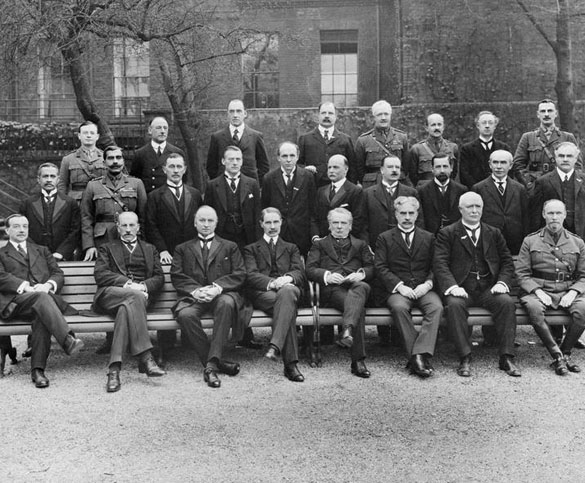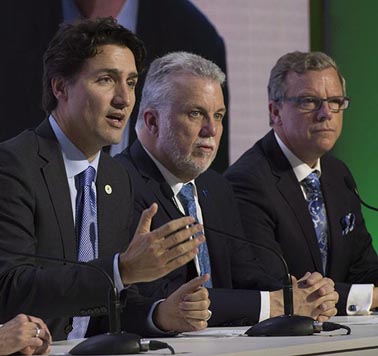Trump “unfit for command”(?), whales in Canadian waters, Brad Wall steps down, & “Our Lady of the Snows, 1911—1921”
Aug 12th, 2017 | By Counterweights Editors | Category: In Brief

Meeting of British empire’s Imperial War Cabinet, London, 1917. UK Prime Minister David Lloyd George is front row, fifth from left. Canadian PM Robert Borden is immediately to his right. Second from left, second row is the Maharaja of Bikaner, Ganga Singh, from India.
GANATSEKWYAGON, ON. AUGUST 11, 2017. It is getting harder and harder for Canadians who watch US TV to know just what is going on in the American Republic led by President Donald Trump.
Rex Tillerson advises against losing sleep, with what looks like a smile. This may be the right worldly wisdom. But it is also hard not to at least sometimes wonder : Are millions of people actually going to have to die – likely including large enough numbers in and/or from North America – just to comfort the juvenile hearts and minds of Donald Trump and Kim Jong Un?
Thoughts like this take wings when we learn from a Keith Olbermann tweet that, as reported in the Wall Street Journal : “Analysts are trying to work out what happens to markets in the event of an all-out nuclear war.” (Olbermann just says “All of them would die #Idiots.”)
Olbermann has also been tweeting : “This mentally unstable man must be removed … 25th Amendment … Impeachment … Any legal means to stop him … Mattis ignoring him.”

l—r : Canada PM Justin Trudeau, Quebec Premier Philippe Couillard, Saskatchewan Premier Brad Wall, First Ministers’ Meeting, Ottawa, 2015.
This  reminds us of :“Brinkley: Trump is ‘unfit for command’ … Author and CNN presidential historian Douglas Brinkley [with a day job at Rice University in Houston, Texas] says the Trump White House is in ‘utter disarray’ and concludes that the president is ‘unfit for command.’ His message: ‘He thinks you can govern by chaos, and it’s not working.’”
Possibly at some other exotic extreme, in Canada our early August TV news reports that the “federal government is ordering large vessels to slow down in the Gulf of St. Lawrence as it tries to protect right whales who frequent the waters … Ten … have died in the gulf since early June … Fisheries Minister Dominic LeBlanc and Transport Minister Marc Garneau were in Pointe-du-Chene, N.B., Friday to announce immediate temporary measures aimed at preventing further whale deaths.”
For political hardball, Saskatchewan’s once beloved premier Brad Wall has decided to step down. (“It has been and will always be the honour of my working life to serve as Premier of this Province that I love” ; “Stunning departure: Premier Wall announces his resignation.”)
See a Maclean’s article from this past June for deep background (Tammy Robert, “Saskatchewan’s Brad Wall problem.”) And note two helpful pieces on the CBC News site : Kendall Latimer on “Who will replace Brad Wall as Saskatchewan Party leader?” ; and  Éric Grenier on “Brad Wall’s departure highlights changing political landscape of Western Canada.”
Talk about changing political landscapes also reminds us that we have just posted the latest installment of Randall White’s work-in-progress, Children of the Global Village – Canada in the 21st Century : Tales about the history that matters.
If you go to “Long Journey to a Canadian Republic” on the bar above (or just CLICK HERE), you will find a short introduction to this modern history of Canadian democracy, along with the “Prologue : too much geography.”
This is followed by links to the currently completed six chapters in Part I, four  chapters in Part II, and the first three chapters in Part III on the old Dominion of Canada. You will now find as well a link to Chapter 4 of PART III : THE DOMINION OF CANADA, 1867—1963, “Our Lady of the Snows, 1911—1921.”
Once more we caught up with Dr. White and his lovely business manager at the Tim Horton’s across from Kew Gardens in Toronto. He had a few quick thoughts on Brad Wall’s Saskatchewan, as well as Robert Borden as Canadian prime minister, in the second decade of the 20th century, which took in the First World War (in the days before nuclear weapons).
“Saskatchewan,” Dr. White remarked, “was the third most populous province in Canada, after Ontario and Quebec, from 1911 to 1941. Now it’s the sixth most populous province, after Ontario, Quebec, BC, Alberta, and Manitoba. Brad Wall was born in 1965. So you might say all this was before his time. But it was somehow still part of his political career. History can do strange things to politics, even when most people don’t know it.”


